List of U.S. National Historic Landmarks by state
The United States National Historic Landmark Program is designed to recognize and honor the nation's cultural and historical heritage. The program was formally inaugurated with a series of listings on October 9, 1960; as of August 21, 2020, there are 2,597 designated landmarks. A National Historic Landmark (NHL) is generally a building, district, object, site, or structure, that is officially recognized by the United States government for its national historical significance. A National Historic Landmark District (NHLD) is a historic district that is recognized as an NHL. Its geographic area may include contributing properties that are buildings, structures, sites or objects, and it may include non-contributing properties.
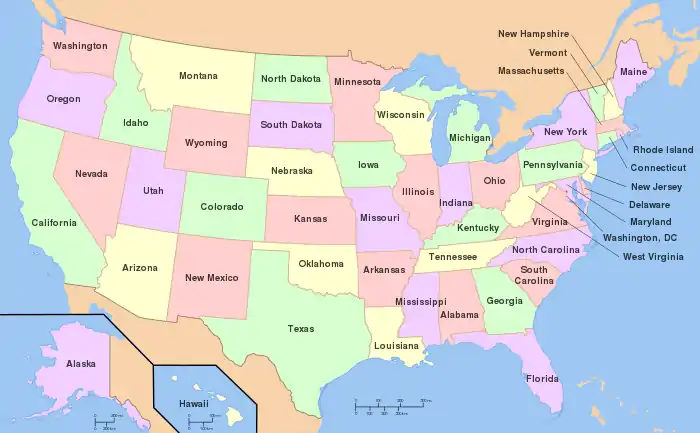
The program is administered by the National Park Service (NPS), a branch of the Department of the Interior. The National Park Service determines which properties meet NHL criteria and makes nomination recommendations after an owner notification process.[1] The Secretary of the Interior reviews nominations and, based on a set of predetermined criteria, makes a decision on NHL designation or a determination of eligibility for designation.[2] Both public and privately owned properties can be designated as NHLs. This designation provides indirect, partial protection of the historic integrity of the properties via tax incentives, grants, monitoring of threats, and other means.[1] Owners may object to the nomination of the property as a NHL. When this is the case the Secretary of the Interior can only designate a site as eligible for designation.[2]
All NHLs are also included on the National Register of Historic Places (NRHP), a list of some 80,000 historic properties that the National Park Service deems to be worthy of recognition. The primary difference between a NHL and a NRHP listing is that the NHLs are determined to have national significance, while other NRHP properties are deemed significant at the local or state level.[1]
Tabular listing
Most landmark designations are in one of the 50 states. New York is the state with the most (270), and New York City, with 114 designations, is the city with the largest number of designations. Of the states, North Dakota has the fewest designations with seven. Three cities (New York City, Philadelphia, and Boston) have enough listings to warrant lists separate from their respective states.
A small number of designations have been made outside the 50 states. Most of these appear in United States possessions. The Virgin Islands have five listings, Puerto Rico has four, and island possessions in the South Pacific have six. Five listings are found in Pacific island nations with which the U.S. has established a free association agreement, and one listing, the American Legation in Tangier (the nation's first foreign public property), is found in the unaffiliated Kingdom of Morocco.
| State or region |
Number of landmarks |
Earliest declared[3] |
Latest declared[3] |
Example |
|---|---|---|---|---|
| Alabama | 39 | October 9, 1960 | January 13, 2021 |  |
| Alaska | 50 | January 20, 1961 | December 23, 2016 |  |
| Arizona | 46[4][5] | October 9, 1960 | December 23, 2016 |  |
| Arkansas | 17 | October 9, 1960 | July 31, 2003 |  |
| California | 146[6][5] | October 9, 1960 | December 23, 2016 |  |
| Colorado | 26[7] | December 19, 1960 | January 13, 2021 |  |
| Connecticut | 63 | October 9, 1960 | October 31, 2016 |  |
| Delaware | 14 | January 20, 1961 | December 23, 2016 | 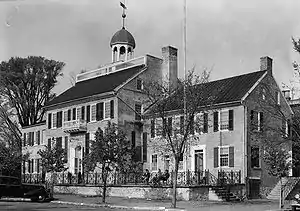 |
| Florida | 47 | October 9, 1960 | January 13, 2021 |  |
| Georgia | 49 | January 20, 1961 | July 21, 2015 |  |
| Hawaii | 33 | December 29, 1962 | March 29, 2007 |  |
| Idaho | 10[8] | October 9, 1960 | June 21, 1990 | 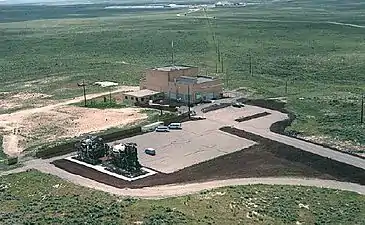 |
| Illinois | 88[9] | October 9, 1960 | September 23, 2020 | 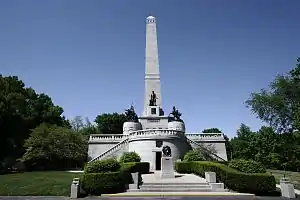 |
| Indiana | 43 | October 9, 1960 | December 23, 2016 |  |
| Iowa | 27[10] | June 30, 1960 | January 13, 2021 |  |
| Kansas | 26 | December 19, 1960 | December 23, 2016 |  |
| Kentucky | 32[11] | December 19, 1960 | February 27, 2013 | 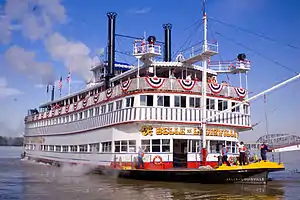 |
| Louisiana | 54 | October 9, 1960 | July 21, 2015 |  |
| Maine | 44 | October 9, 1960 | August 25, 2014 |  |
| Maryland | 75[12] | October 9, 1960 | January 13, 2021 |  |
| Massachusetts (Boston alone) |
189 (57) |
October 9, 1960 | February 27, 2015 | 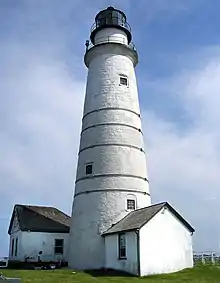 |
| Michigan | 43 | October 9, 1960 | January 13, 2021 |  |
| Minnesota | 25 | December 19, 1960 | June 23, 2011 |  |
| Mississippi | 40[13] | July 19, 1964 | February 16, 2017 |  |
| Missouri | 37[9] | October 9, 1960 | March 29, 2007 |  |
| Montana | 28[8] | October 9, 1960 | July 21, 2015 | .jpg.webp) |
| Nebraska | 22 | December 19, 1960 | January 13, 2021 |  |
| Nevada | 8[4] | January 20, 1961 | October 16, 2012 |  |
| New Hampshire | 23 | October 9, 1960 | February 27, 2013 |  |
| New Jersey | 58[14][15] | October 9, 1960 | August 25, 2014 |  |
| New Mexico | 46[7] | October 9, 1960 | October 16, 2012 |  |
| New York (New York City alone) |
276[14][16] (116) |
October 9, 1960 | January 13, 2021 |  |
| North Carolina | 39 | November 5, 1961 | December 23, 2016 | 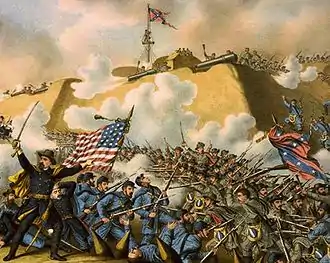 |
| North Dakota | 7 | July 4, 1961 | December 23, 2016 |  |
| Ohio | 76[11][17] | October 9, 1960 | December 23, 2016 |  |
| Oklahoma | 22 | December 19, 1960 | February 27, 2013 |  |
| Oregon | 17[6][18] | January 20, 1961 | July 25, 2011 | 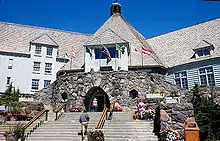 |
| Pennsylvania (Philadelphia alone) |
169[15][17][16] (67) |
January 20, 1961 | December 23, 2016 |  |
| Rhode Island | 45 | October 9, 1960 | October 16, 2012 | 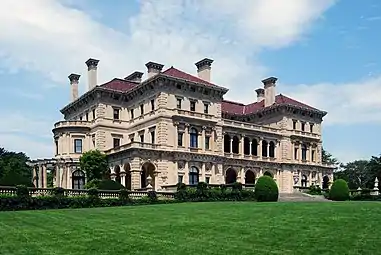 |
| South Carolina | 76 | October 9, 1960 | March 29, 2007 |  |
| South Dakota | 16[10] | July 4, 1961 | June 17, 2011 |  |
| Tennessee | 31[13] | October 9, 1960 | August 21, 2020 |  |
| Texas | 49 | December 19, 1960 | January 13, 2021 | 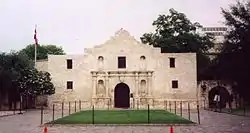 |
| Utah | 14 | January 20, 1961 | June 23, 2011 |  |
| Vermont | 18 | September 22, 1960 | August 25, 2014 | 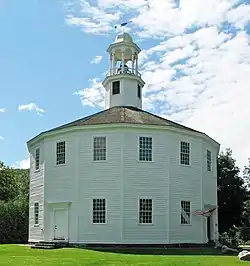 |
| Virginia | 123 | October 7, 1960 | January 13, 2021 | .jpg.webp) |
| Washington | 24[18] | July 4, 1961 | August 19, 2008 |  |
| West Virginia | 16 | July 19, 1964 | July 31, 2003 |  |
| Wisconsin | 44 | October 9, 1960 | January 13, 2021 |  |
| Wyoming | 27 | December 19, 1960 | December 23, 2016 | 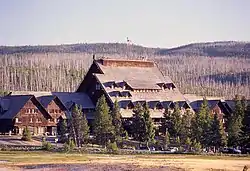 |
| District of Columbia | 75[12] | December 19, 1960 | January 13, 2021 |  |
| U.S. Commonwealths and Territories[19] |
17 | October 9, 1960 | March 11, 2013 |  |
| Associated States[20] | 5 | December 17, 1982 | September 16, 1985 |  |
| Foreign States[21] | 1 | December 17, 1982 | December 17, 1982 |  |
| Duplicates | (19) | 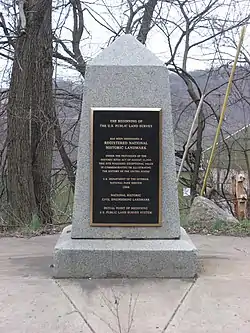 | ||
| Total | 2,616 | June 30, 1960 | January 13, 2021 |
Notes
- "National Historic Landmarks Program: Questions and Answers". National Historic Landmarks Program. National Park Service. Retrieved September 21, 2007.
- "Title 36 of the Code of Federal Regulations, Part 65". US Government Printing Office. Archived from the original on February 17, 2012. Retrieved April 5, 2008.
- National Park Service (June 2011). "National Historic Landmarks Survey: List of National Historic Landmarks by State" (PDF). Archived from the original (PDF) on 2011-11-05. Retrieved 2011-07-04.
- Hoover Dam overlaps and is counted in both Arizona and Nevada.
- Yuma Crossing and Associated Sites included in both Arizona and California
- Lower Klamath National Wildlife Refuge included in California and Oregon
- Raton Pass and Denver & Rio Grande Railroad San Juan Extension included in Colorado and New Mexico.
- Lemhi Pass and Lolo Trail appear in Idaho and in Montana.
- Eads Bridge overlaps and is counted in both Illinois and Missouri
- Blood Run Site included in Iowa and South Dakota
- Covington and Cincinnati Suspension Bridge included in Kentucky and Ohio
- Washington Aqueduct included in both Maryland and Washington, D.C.
- Siege and Battle of Corinth Sites included in Mississippi and Tennessee
- Holland Tunnel and Palisades Interstate Park included in both New Jersey and New York
- Minisink Archeological Site and Washington's Crossing included in New Jersey and Pennsylvania
- Delaware and Hudson Canal included in New York and Pennsylvania
- Beginning Point of the U.S. Public Land Survey included in Ohio and Pennsylvania.
- Bonneville Dam Historic District included in Oregon and Washington
- The U.S. Commonwealths and Territories having NHLs are: American Samoa (with 2), Midway Islands (1), Northern Mariana Islands (2), Puerto Rico (4), Virgin Islands (5), and Wake Island (1).
- The Associated States having NHLs are Marshall Islands (with 2), Federated States of Micronesia (2), and Palau (1).
- The only foreign state having a U.S. NHL is Morocco (with 1 NHL).
References
- National Park Service. "National Historic Landmarks Program". nps.gov. Retrieved September 8, 2018.
- National Park Service. "National Historic Landmark Program: NHL Database". Archived from the original on June 6, 2004. Retrieved March 24, 2012.
- National Park Service. "National Historic Landmark Program: Properties Determined Eligible for Designation as National Historic Landmarks".
- National Park Service. "National Historic Landmark Program: Withdrawal of National Historic Landmark Designation".
- Department of the Interior (January 16, 2009). "Interior Secretary Kempthorne Designates 9 National Historic Landmarks in 9 States". Archived from the original (Press Release) on March 5, 2009.